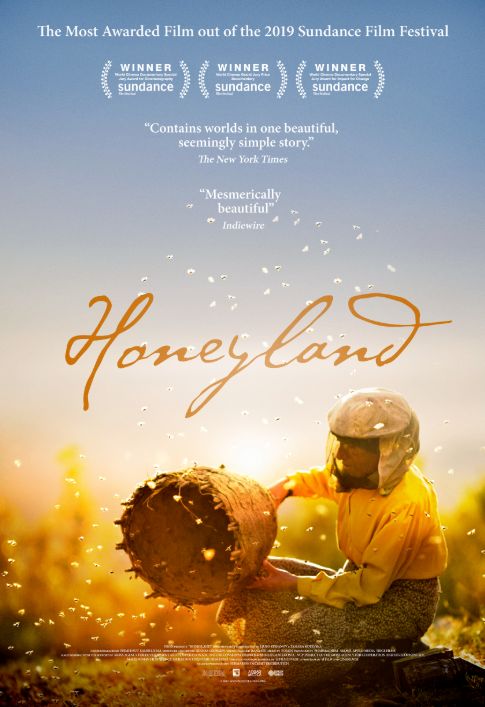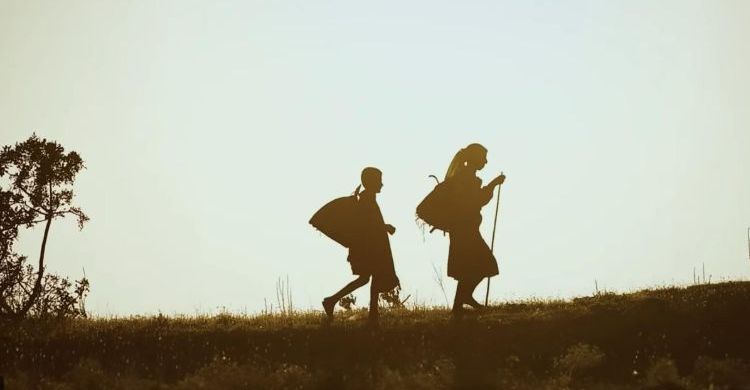Doc Corner: 'Honeyland'
 Wednesday, July 31, 2019 at 12:00PM
Wednesday, July 31, 2019 at 12:00PM By Glenn Dunks
 You know a movie is going to give you something when within the first two minutes, it makes you bolt upright and exclaim “Oh wow!” to an empty room. The eyes pop and the eyebrows raise as you marvel at the sheer unexpectedness of what is on screen. In Tamara Kotevska and Ljubomir Stefanov’s Honeyland, the image in question is that of an aging beekeeper straddling precariously along a cliff-face to a hive hidden among the rocks. Surrounded by grey and brown, Hatidze Mutatova (who I assume is in her 50s?) reveals a wedge of golden honeycomb. The gold in the rocks.
You know a movie is going to give you something when within the first two minutes, it makes you bolt upright and exclaim “Oh wow!” to an empty room. The eyes pop and the eyebrows raise as you marvel at the sheer unexpectedness of what is on screen. In Tamara Kotevska and Ljubomir Stefanov’s Honeyland, the image in question is that of an aging beekeeper straddling precariously along a cliff-face to a hive hidden among the rocks. Surrounded by grey and brown, Hatidze Mutatova (who I assume is in her 50s?) reveals a wedge of golden honeycomb. The gold in the rocks.
It’s a startling way to open a film from a purely logistical standpoint. It’s also a visual that really clues the viewer into its subject's tenacity and sheer force of nature abilities as a cultivator and protector of bees – an animal, after all, that is vital to the existence on Earth of everyone from those of us in major metropolises to those, like Hatidze, in isolated, wind-swept, mountainous regions of Macedonia...

It is not hard to see why Honeyland has won so many audience awards at festivals around the world. Filmed over three years, this story of the last in a long line of traditional Macedonian beekeepers, is obviously quite beautiful to look at with sun-kissed countryside where Hatidze farms honey in all sorts of unexpected nooks and crannies (a shielded hole in a shack, a tree trunk and so on). It’s also a poignantly sweet affair – pun not intended – that finds its subject stoking the fires of her family tradition while taking care of her ailing mother and guiding the inquisitive son of a neighbouring family of nomadic, interloping beekeepers and cattle-farmers.
It’s the latter element that yields much of Honeyland’s bigger narrative hooks, as Hatidze struggles to implore upon her neighbours the importance of her beekeeping methods that they are all too willing to dismiss in favour of unattainable short-term financial goals. In one of the film’s saddest moments, the pig-headed father rips a chainsaw into a tree that houses a nest of bees at the incistence of a trader only to have it fall into the river below against shouts to not let the bees drown. A rather telling metaphor for the world’s negligent treatment of the environment and how nature far too often comes out second best to greed.
And the melancholy of that moment begins to linger over the film more prominently as it goes along. Hatidze worries about what will happen when her mother eventually dies, and she is left alone with just her bees and her pet cats and dog. In the movie’s best sequence, she discusses with her mother why no man ever asked for her hand in marriage and the answer is heartbreaking. What happens to Hatidze after the credits role, I do not know, but I hope it as full of life and vibrancy as she herself is.

I can’t say scene after scene of buzzing bees did not set my anxiety on high alert; when the new family of beekeepers next door try their hand at it without suits or even masks, I wanted to scream. As somebody who will literally run away from a bee hovering in my general direction and who couldn’t even make it through shlock like The Swarm, to say it was a little bit hard to sit through is probably an understatement. However, a pulsing heartrate was worth it for the opportunity to be let into a world that I didn’t even know existed. Truly, who knew there was a tradition of beekeepers in the hills of Macedonia of all places?
In many ways it reminded me of Mo-young Jin’s tender South Korean documentary My Love, Don’t Cross That River with its aging couple who wear matching outfits and live their humble existence stuck somewhere between tradition and the fringes of contemporary society. Honeyland is sweet and nimbly assembled, but the painful reality of life is never too far away.
Release: Currently in limited release.
Oscar chances: It’s been – sorry for another accidental pun – buzzy in its festival roll-out and last year’s doc finalist list featured some braver non-fiction choices from further afield so I couldn’t count it out just because it’s a Macedonian movie about beekeeping. I suspect those who actually watch it will come away suitably impressed, but it is true that it could look minor compared to bigger, glossier films of world politics.
 Doc Corner,
Doc Corner,  Honeyland,
Honeyland,  Review,
Review,  documentaries
documentaries 


Reader Comments (3)
Just saw it last night, so commentary is fresh from my mind. Good summary (as usual). That opening 2 minutes was even more awe-inspiring on a big cinema screen.
From something mentioned somewhere in the early part of the film, I worked out that Haditze would be around 54 today (which surprised me as she looked a LOT older).
The one extra thing, which was discussed by some of us after the screening, was the classic "is this a documentary or a well-acted drama" debate. Around the time that the camera (which was never acknowledged in the movie at any time, which helps the ambiguity) was watching the neighbour couple arguing, I questioned whether they would really be that ambivalent about a shooting team present in that most personal of circumstances. Another documentary mini-feature about how the movie was shot would be fascinating. (Also adding to this debate was the sound design - given the loudness of the bees on many occasions, I don't think (in an unprofessional opinion) that this could have been captured on site, which is fine but added to the feel of staged drama.)
But this in no way detracted from the high quality of the film.
Travis, that's a very good observation. I feel like in those cases - something like An Episode in the Life of an Iron Picker - the blend is made more prominent. As far as I am aware, there doesn't appear to be any hint from the production that that's the case here. Maybe I am wrong and missed it thought.
Does anyone know what happened to
Hatidze after the filming was over. I found it heartbreakingly beautiful but tragic. Except for that teeny glint of joy in Hatidze‘s eyes at the end.